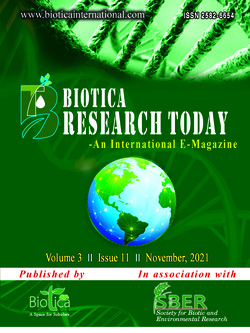
Mericloning of Potato (Solanum tuberosum L.) for Virus Free Plant Production
Rajesh, S.*
Centre for Plant Molecular Biology and Biotechnology, Tamil Nadu Agricultural University, Coimbatore, Tamil Nadu (641 003), India
Varanavasiappan, S.
Centre for Plant Molecular Biology and Biotechnology, Tamil Nadu Agricultural University, Coimbatore, Tamil Nadu (641 003), India
Manivannan, M.I.
TNAU- Horticultural and Forestry Research Station, Fairy Falls road, Kodaikanal,
Tamil Nadu (624 103), India
DOI: NIL
Keywords: Disease free, Mericloning, Micropropagation, Potato
Abstract
Micropropagation through mericloning using meristem tips is a key strategy for virus free plant production in major crops that would yield genetically stable plants. Meristem cells from root or shoot apices serves as explant source. Potato viruses cause serious impact in production and lead to huge yield loss. Commercial production of disease free potatoes for nutritional and seed purposes demands adoption of combined strategy of mericloning with other therapeutic procedures like thermo/ chemo therapy for large scale propagation.
Downloads
not found
Reference
Naik, P.S., Karihaloo, J.L., 2007. Micropropagation for Production of Quality Potato Seed in Asia-Pacific. Asia-Pacific Consortium on Agricultural Biotechnology, New Delhi, India, p. 54.
Waswa, M., Kakuhenzire, R., Ochwo-Ssemakula, M., 2017. Effect of thermotherapy duration, virus type and cultivar interactions on elimination of potato viruses X and S in infected seed stocks. African Journal of Plant Science 11(3), 61-70.
